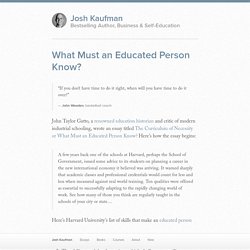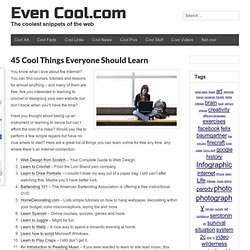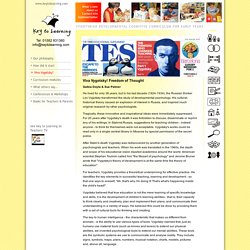

What Must an Educated Person Know? “If you don’t have time to do it right, when will you have time to do it over?”

John Wooden, basketball coach John Taylor Gatto, a renowned education historian and critic of modern industrial schooling, wrote an essay titled The Curriculum of Necessity or What Must an Educated Person Know? Here’s how the essay begins: A few years back one of the schools at Harvard, perhaps the School of Government, issued some advice to its students on planning a career in the new international economy it believed was arriving.
It warned sharply that academic classes and professional credentials would count for less and less when measured against real world training. Here’s Harvard University’s list of skills that make an educated person The ability to define problems without a guide. After listing these skills, Gatto continued: I found Harvard’s list fascinating. 45 Cool Things Everyone Should Learn. You know what I love about the Internet?

You can find courses, tutorials and lessons for almost anything – and many of them are free. Are you interested in learning to crochet or designing your own website but don’t know when you’ll have the time? Have you thought about taking up an instrument or learning to dance but can’t afford the cost of a class? Would you like to perform a few simple repairs but have no clue where to start? Here are a great list of things you can learn online for free any time, any where there’s an Internet connection.
Web Design from Scratch – Your Complete Guide to Web Design.Learn to Crochet – From the Lion Brand yarn company.Learn to Draw Portraits – I couldn’t draw my way out of a paper bag. This list isn’t complete by any means. And you will like also this cool posts: Five Geeky Things You Should Learn or Do This Summer. Summer is coming, and for many that means breaks, vacations, and general lulls in our lives (well, those of us without kids, and full-time jobs).

Even if you don’t have a ton of free time this summer, I think there’s just something about the season that speaks to casual learning. The weather’s great, the trees are in bloom, and I don’t know—maybe it has to do with lingering memories from childhood, but I always feel like summer is the best time to learn, you know, Emerson and Thoreau style. So here’s five geeky things you can do this summer to add to your geek repertoire. Let’s think outside the motherboard on this one. Low-tech, but high-geek. Memorize a poem. Kio Stark » Don’t Go Back to School. Here is a radical truth: school doesn’t have a monopoly on learning.

More and more people are declining traditional education and college degrees. Instead they’re getting the knowledge, training, and inspiration they need outside of the classroom. Drawing on extensive research and over 100 interviews with independent learners, Kio Stark offers the ultimate guide to learning without school. Skilled at visual learning? Measure your musical-visual intelligence online! While working at the music and neuroimaging lab at Beth Israel/Harvard Medical School in Boston, I developed a quick online way to screen for the tonedeafness.

It actually turned out to be a pretty good test to check for overall pitch perception ability. The test is purposefully made very hard, so excellent musicians rarely score above 80% correct. Give it a try! In our research, we were looking for neuro-anatomical correlates of tonedeafness (called "congenital amusia" in the scientific literature. eLearning Brothers - eLearning awesomeness. eLearning Industry - Post your eLearning article. At eLearning Industry you will find the best collection of eLearning articles, eLearning concepts, eLearning software, and eLearning resources. E-Learning Provocateur.
Key to learning. Viva Vygotsky!

Freedom of Thought Galina Doyla & Sue Palmer He lived for only 38 years, but in his last decade (1924-1934), the Russian thinker Lev Vygotsky transformed the study of developmental psychology. His cultural-historical theory caused an explosion of interest in Russia, and inspired much original research by other psychologists. Tragically, these innovative and inspirational ideas were immediately suppressed. After Stalin's death Vygotsky was rediscovered by another generation of psychologists and teachers. For teachers, Vygotsky provides a theoretical underpinning for effective practice. Vygotsky believed that true education is not the mere learning of specific knowledge and skills, it is the development of children's learning abilities - that is, their capacity to think clearly and creatively, plan and implement their plans, and communicate their understanding in a variety of ways.
Cultural tools are not inherited genetically. Vygotsky calls this an external monologue.